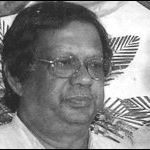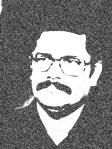Dhurjati: Some critics are of the opinion that you are one of the main architect of Bengali fictional prose ; of the same exalted class as that of Satinath Bhaduri, Kamal Kumar Majumdar, Subimal Basak and Subimal Misra. However, you are the exceptional torchbearer in this regard. What is your opinion ?
Malay: See, compared to European languages, Bengali prose is quite recent. Mathi Likhito Susamachar ( Gospels of St Mathew ) was published in 1800. Sixty five years after that, Bankimchandra Chattopadhyay‘s novel Durgeshnandini was published. Third stage in prose arrived in 1914 when Pramatha Choudhury started publishing the periodical Sabujpatra ; that would mean a three year old kid. Compared to this the Jews Had their Old Testament in ancient times. The Apology of Socretes by Plato, Poetics by Aristotle, and Confessions by Saint Augustine appeared in 3rd century BC. Six hundred years before Pramatha Choudhury, Decameron was written by Boccaccio. The Praise of Folly was written by Desiderius Erasmus ; Castiglione had written The Book of the Courier. Think of Rabelais who wrote Gargatuan Pantagruel four hundred years before Rabindranath Tagore was born ; Autobiographical Prose was written by Benvenuto Cellini, Don Quixote was written by Miguel De Cervantes. How many names of European prose writers do you want me to refer to ? Pascal in 17th century, Voltaire and Rousseau in 18th. Obviously the appearance of Edgar Allan Poe, Nathaniel Hawthorne, Herman Melville, Balzac, Flaubert, Turgenev, Dostoevsky, Tolstoy, Chekov, Henry James in 19th century was a foregone conclusion. The prose writers who came after them in Europe revolutionized sentence structures, construction of words, diction, expressive inventions. To name a few : James Joyce, Andre Gide, Thomas Mann, Frantz Kafka, Marcel Proust, D.H.Lawrence, Jean Paul Sartre, Albert Camus and William Falkner. The labour and love invested by Borges, Gabriel Garcia Marquez, Salman Rushdie in their prose is evident if you leaf through just a few pages of their books. Can you imagine as to which height the language and expressive medium has reached in their society as a result of their contributions ? Compare the rich prose used for conveying news by reporters of CNN and BBC with our Doordarshan, Ananda (ABP), ETV, Akash, Chobbish Ghanta, Kolkata TV etc. Right from the war zone or accident site the extempore prose the Westerners are using is far more developed than even the written news of our Broadcasters. Read the pages of TIME, Newsweek and London newspapers alongside Ananda Bazar Patrika, Ganashakti of Kolkata. Compare the lectures of illiterate President George Bush with our erudite Chief Minister Buddhadeb Bhattacharya ; you will find even in prose Bush is wealthy. It is the writer who has to take up the job of nurturing Bengali prose. The foremost duty of a Bengali fiction writer is to develop the language and make it rich. Well crafted stories may be narrated by any grandmother. The question is not of converting language into Arts. The issue is of loving your mother tongue, local and geographical, and respecting it.
Dhurjati: Concurrently, you have had to talk about writers’ honesty on several occasions. In the present Indian context, West Bengal in particular, don’t you think ‘morality’ or ‘de-morality’ are just hollow words ?
Malay: The word honesty is so all pervasive in gambit, that virtue, morality, ethics, commitment etc—- every value system come within its purview. Actually, for the weak-kneed bengali, it is very difficult to disregard the values of life emanating out of the power structure of society. I had analyzed the present society of West Bengal in 2001 issue of Khanan magazine of Nagpur ; the essay is titled Postmodern Times and the Fall of Bengalies. It was to be included in the Little Magazine Digest, but the editor of the Digest Mr Jyotirmoy Das panicked and rejected it. You may go through the essay in Khanan. I do not know how we are going to get out of the hell that the people of West Bengali have got themselves trapped in post colonial logjam. The putrefaction is much deeper than immorality and dishonesty. Most of the poets, writers, critics— not only in the case of servants of media, but in Little Magazine world as well, lack self-confidence and self-respect, and are chicken-hearted , greedy and brazen faced. They don’t love the place called West Bengal. Sunil Gangopadhyay, wants the name of West Bengal changed to Bangla, but would not like the name of East Bengal Football Club changed to Football Club of Bengalies.
Dhurjati: “You can’t carry your flag of honesty to places where millions of Rupees are spent on fireworks by individuals in one single night during Diwali festival, lecherous lasses collect gold biscuits in day-night performance.” You had, in an interview to Arunesh Ghosh, said these words. The word ‘honesty’ is very relevant here. To a postmodern thinker, does honesty of the day entail death of modernity ?
Malay: Are you attacking Arunesh Ghosh ? In that case he has to answer this question. It is true, he is simultaneously writing in DESH, associating himself with Marxist Communist Party in power, trying to prove himself a participant in the Hungryalist movement, has declared himself to be an anti-establishment writer, etc. Don’t you think such a character signals the end of modernity ? Arunesh Ghosh is a present day Bengali, a member of the dreaded School Teacher Gang of the ruling party. However, his brandishment is visibly palpable at the micro level. Of late he has been found to have opposed the present power brokers of West Bengal. His modernist ideals might have withered away, but what about the dead end where the philosophy of idealism itself has reached ? LTTE, Jaish-e-Mohammad, ULFA, HUJI, Al Qaida, NLFT, LET, Hizbul Mujahideen etc are all fluttering some sort of flags of idealism to kill human beings. Modernity died at that juncture. And thus the relevance of local narratives. hordes of border-crossing ungrateful Bengalies have destroyed the ‘local’ society and culture of North West Bengal by grinding it under the steamroller of the grand narrative. Arunesh Ghosh is obviously pained and guilt stricken as he is one of those border-crossing Bengalies who have decimated the Coch, Mech and Rajbanshi people.
In reply to second part of your question, I’d like to say that one may be a modern person ; but just because the structure of his writings is postmodern, you need not label him as postmodern. Local narratives may term him as Dalit, Subaltern, Green Peacenik, Environmentalist, Feminist, Anti Global etc., or he may be part of any other micro level protest ; here their honesty is unchallangeable. It is mainly because of their honest intent that so many Public Interest Litigations are being filed in various High Courts and Supreme Court.
Dhurjati: What is the explanation of morality and moralization in the Uttaradhunika or Adhunantika perspective ?
Malay: These days I prefer to use the word Postmodern in place of Uttaradhunika or Adhunantika. Linguist Dr Prabal Dasgupta had coined the synonym Adhunantika in the Indian perspective ; that is because some pro-establishment poets such as Anjan Sen, Amitava Gupta etc. had launched a poetry movement named Uttaradhunika. The idea of literary movements itself is a relic of modernism. As was Hungryalist movement. All literary movements have been conceived on the assumption of the Grand Narrative of Time and human civilization as linear. In modernist prescription one could predict the march of history. Which means the structure of present and future are known beforehand. One may conceive of theories. Postmodernity is an open-ended space. It can not predict the future. However, it analyzes the present and identifies the features. It surpasses the author to examine his texts. If you deconstruct their discourse, you will be able to make out as to why these people turned out in to great frauds who took refuge in the Grand Narrative. People who once bragged about social commitment, today we have come to know that they had forcibly occupied other people’s lands, which they are selling now to promoters-builders. Through their Grand Narrative traps they catch voters. This is whu postmodernists are giving importance to local narratives. Postmodern ethics is : “Small is Better than Big”. Microforms or microlevel systems, disciplines, relations, face negligible erosions, if confronted. That is why they are better than macroform systems. Macrolevel moralities were imposed by Stalin, Pol Pot, Hitler, Pinochet, Franco, Idi Amin, Yahya Khan, etc.
Dhurjati: If ‘Establishment’ is a modernist epithet, what is the postmodern or Adhunantika flip side ?
Malay: No, no. A word can not be modernist or postmodernist, that way. The idea within an epithet can be confronted from modernist or postmodernist view. Modernists, I am talking of West Bengal, who are embeded in governmental Grand Narrative, have been labeling Ananda Bazar Patrika corporate house as Establishment. Whichever government is installed at the Centre in Delhi, they call it Step Mother Establishment. That is an epistemic fraud. Ganashakti newspaper and the local government secretariat are limbs of the same power structure. The Bengali Marxists do not have faith in the governmental Grand Narrative though ! In the postmodernist perspective when you talk of local narratives, all suzernities are ‘Establishment’. Patriarchy is establishment to Feminists. For Subaltern writers the State Award Committees lorded over by upper caste writers are establishment. Some son of the soil of West Bengal, ie., the original inhabitants, unlike East Pakistani refugees, had told me last year that the Bangla and Sahitya Academies have been captured by those erstwhile refugees who have converted them into Hindu East Bengali Establishment. Muslim writers consider these Award Committees as Hindu Establishment.
Dhurjati: I consider your poetry collection Shoytaner Mukh ( Face of The Devil ), wherein some of the poems were stamped CANCELLED, as postmodern or Adhunantika. Would you yourself call it modern ?
Malay: Oh ! I find you remember it. The day the book was released, it created much turmoil at the Kolkata Coffee House ! Publisher Sunil Gangopadhyay had gone to Iowa, USA to learn how to write poems., and the Krittibas group was headed by stop-gap leader Saratkumar Mukhopadhyay. I do not have a copy of the book. I am unable to recall the poems which were branded CANCELLED. The rubber stamp was used at that time to cancel gilt-edged bonds. I guess it may be explained this way : “the pages which were marked CANCELLED could be construed postmodern in the sense that their beginning and exit points got a visual structure of being wide-open.” Anyway, it has become one of watershed legend of the Hungryalist movement. The event was an iconoclastic venture which in retrospect now appears to be one of the ultimate triumph of modernism, that artistic game in which life was put at stake and the rules of which required such brazen acts of impudence to be legitimized by manifestoes.
Dhurjati: Today the market culture is the superordinate ruler ; consumerism is victorious. What is the postmodern explanation ?
Malay: This exactly is the condition which people are terming as end of modernism, or the Postmodern Condition in India. In such a situation the market is the superordinate discourse to which corporate media literature of potboiler writers is relativised, and in which it finds meaning and justification. Just as dot-pens and injection syringes have now become disposable, so are poetry books, novels, films, compact discs, DVDs, songs, paintings, etc. In today’s West Bengal, there is an intensification of awareness of incoherence, along with the decline in the need for order. It reveals an equivocality about the meanings and relations of things, matched by willingness to live with uncertainty to tolerate the contemporary West Bengali world seen as random and multiple and even incongruent.
Dhurjati: A creative person’s life long struggle is not for amassing money or wealth. It is rather a desire for recognition which spurs him. How far is it applicable to you ?
Malay: Who told you only poets and writers are creative persons ? Doctors, farmers, labourers, engineers, hawkers, shopkeepers, cooks, train drivers, miners, pilots are all creative persons. Otherwise the Homo Sapiens who once emerged from Africa would not have danced on the surface of moon. The human being in a collective is very complex. He keeps on breaking barriers and enhancing frontiers. That is how we got high yielding Taichung paddy, Operation Flood, Borlaug’s wheat, cloning, heart transplant, Save Narmada River Movement etc. I am similar to such collective humans. Paradigm shift takes place because of the work of ‘thinking’ of some people. As a result his work or thought comes down to everybody’s notice and benefit.
( Translated from Bengali by Indrajit Bhattacharya )




Comments
Dear Dhurjati Chanda, I would love to speak with you about a contemporary poetry initiative we have begun in Kolkata, which led me to the work of the Hungryalist’s and Bengali poets. Please contact me at realstoriesgallery@gmail.com, Rachel Chapple, PhD